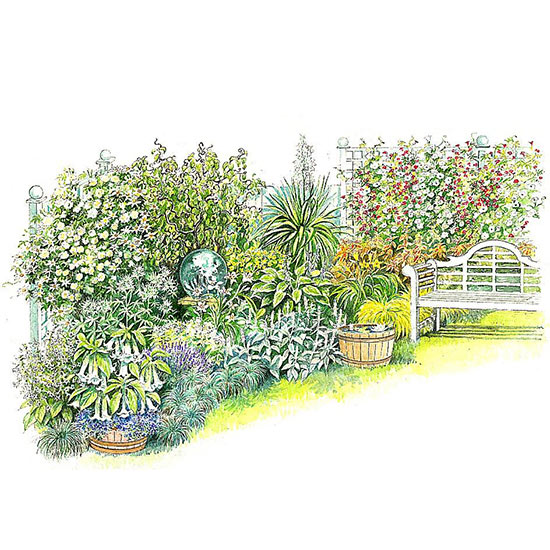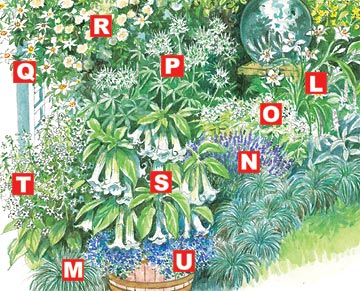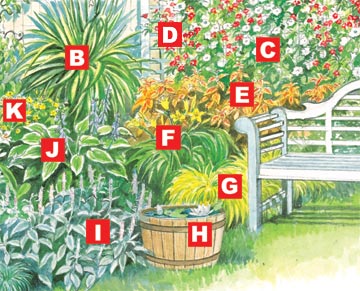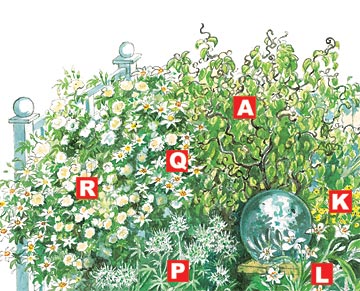






There is something quite magical about a garden at night. To truly appreciate it, you have to sit down and let the worries of the day fade for at least 10 minutes until your eyes adjust to the dark. Light colors and white take on a new glow, and many blooms appear to float because the green stems and leaves fade into the darkness. What¿s more, the lighter colors of variegated plants become more pronounced in the evening.
Although a moon garden is often conceived as a summer garden, don't neglect plants that can be enjoyed in other seasons. Plants with interesting architectural form, such as the Harry Lauder's walking stick in this garden, offer interest even in the dead of winter.
Night-bloomers such as moonflowers, four-o'clocks, and angels' trumpets, add their own unique qualities to the garden; their fragrances attract night pollinators. Sound is another element to consider. At sunset, when temperatures cool and breezes whip up, there's nothing quite like the swishing foliage of grasses, bamboos, and even pine trees as they flutter in the wind.
One of the most important components of a moon garden is a place to sit and take in the view. You can put a chair in the middle of the garden or place a bench along the perimeter. There is no right or wrong spot; just make sure it's comfortable. No matter how good that wrought-iron love seat looks, it won't get much use without cushions to soften the perch.
continue reading below
L 'Sunday Gloves' daylily (Hemerocallis spp.), 30x18 inches, Zones 3-10, three plants M Blue fescue (Festuca glauca), 12x12 inches, Zones 4-8, five plants N 'Munstead' lavender (Lavandula angustifolia), 18x24 inches, Zones 5-8, six plants O Snow-on-the-mountain (Euphorbia marginata), 3 feet x 18 inches, self-seeding annual, three plants P White cleome (Cleome hassleriana), 5 feet x 18 inches, annual, five plants Q Clematis 'Henryi,' Zones 4-9, two plants R White climbing rose (Rosa spp.), hardiness depends on cultivar, one plant S Angels' trumpets (Brugmansia arborea), 7x5 feet, annual, one plant T Flowering tobacco (Nicotiana sylvestris), 5x2 feet, annual, six plants U Blue lobelia (Lobelia erinus), 6x6 inches, annual, five plants

B Variegated yucca (Yucca filamentosa 'Variegata'), 30 inches x5 feet, Zones 5-10, three plants C Moonflower (Ipomoea alba), 12-15 feet, annual, five plants D Cardinal climber (Ipomoea x multifida), 6-10 feet, annual, five plants E Coleus 'The Line' (Solenostemon scutellarioides), 30x30 inches, annual, five plants F 'Bitsy' daylily (Hemerocallis spp.), 18x12 inches, Zones 3-10, three plants G Golden Hakonechloa grass (Hakonechloa macra 'Aureola'), 14x16 inches, Zones 5-9, seven plants H 'Albert Greenberg' waterlily (Nymphaea spp.), 2 feet tall, Zones 8-11 or annual, one plant I Lamb's-ears (Stachys byzantina), 18 inches x 2 feet, Zones 4-8, five plants J Hosta 'Patriot,' foliage: 2x3 feet, flowers: 30 inches, Zones 3-8, three plants K Four-o'clocks (Mirabilis jalapa), 3x2 feet, self-seeding annual, five plants

A Harry Lauder's walking stick (Corylus avellana 'Contorta'), 12-15 feet, Zones 3-9, one plant K Four-o'clocks (Mirabilis jalapa), 3x2 feet, self-seeding annual, five plants L 'Sunday Gloves' daylily (Hemerocallis spp.), 30x18 inches, Zones 3-10, three plants P White cleome (Cleome hassleriana), 5 feet x 18 inches, annual, five plants Q Clematis 'Henryi,' Zones 4-9, two plants R White climbing rose (Rosa spp.), hardiness depends on cultivar, one plant
Copyright © www.100flowers.win Botanic Garden All Rights Reserved